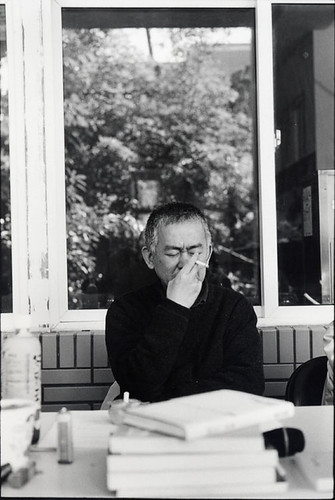www.psychspace.com心理学空间网整個九零年代, 我在治療室和起居室這兩個房間之間返復地移動, 相距半里, 其間正是醫院的太平間. 白日告別式無日無之, 深夜踩著疲憊的身影, 亦常偶遇死亡擦肩而過, 藍幕推車載著往生, 或有悲泣迤邐伴隨, 或無親無故無人相送, 祇有葬儀師傅的煙點點火紅在黑夜中一前一後.
每早, 入治療室, 棄隔日餘茶, 砌一壺新茶, 兩張陳舊座椅相對, 茶几漬痕已久. 這乍看無奇的房間裡, 我在我遇我聞我思我感我怒我悲我懷我awed by 人間情事的敘事. 生命和死亡,懷舊和傷逝(nostalgia and mourning), 是返復的leitmotif. 而治療者是這個人私己回憶敘事的見證和保管者.
很長一段時間, 被治療者不知道他/她從那裡來, 為什麼來到這裡, 要往那裡去; 很長一段時間,被治療者不知道治療者是誰; 很長一段時間, 治療者也還不知道被治療者是誰; 很長一段時間,被治療者聽不到自己的聲音; 很長一段時間, (被)治療者以為自己終於知道一點什麼, 但不多久又覺得還是什麼都不知道; 很長一段時間, 過去和現在, 愛與恨, who are you和who am I, 一直在返復辯證著; 很長一段時間, 治療者承受著這一切, 而被治療者過渡著這一切. 如果照顧是labor of love, 書寫是labor of love, 是的, 治療正是labor of love.
而這裡講的照顧,書寫,治療,祇能是ordinarily good. 人間生命值得珍惜的痕跡從來都祇能是ordinarily good, 所有宣稱extraordinarily good者, 毫無例外都是propaganda. 這和labor或love顯然無關. (且慢, 這裡, 我聽到extreme者的嘲笑聲.)
1999年7月26日, Eve寫了一段話放在Amazon網頁書目之後, 應是此書出版未久. 不要翻譯了, 整段如下:
Exploring the poetics of “ordinary good therapy”
The motivation for this book was my wanting to figure out how significant personal change could possibly result from the rather mild, un-earth-shaking personal routines of interaction called psychotherapy. While in therapy I could tell that real shifts were happening, but not how or even quite when. The therapists’ case histories and psychoanalytic theory I read weren’t much help in understanding this intimate texture. I realized that there weren’’t many models for a patient’s-eye-view narrative of the “dailiness” of good therapy. The models that turned out to interest me most were the Platonic dialogue, and the Japanese prose-and-haiku travel narratives called haibun. Of course there’s a particular therapist and a particular patient in A DIALOGUE ON LOVE, but the point of the book isn’t to make either one sound very special, or to highlight
some sensational revelation or other. More, it’s to find some ways of capturing the power and fun of a kind of interaction that’s both important and mysterious to a lot of people who engage in it.
目前我們所理解的心理治療這種自我救贖的儀式, 始於十九世紀末, 精神上屬modernity. 但十分弔詭, the symptom both reveals and conceals, the solution is the problematique.Modernity 是不迴首的, 一往顛覆拆建自己, 所謂永續進步發展的, 而人依然是要老病死, 依然是要憂 鬱的.(憂鬱之本質在於人遇到了自己.) 這個perpetuality是徹徹底底不知所止的restlessness. Modernity 如是,postmodernity更形劇烈如是,這一切被治療者不免於是,治療者又何能免於是,這兩個perpetualities遂又能往那裡去?
而Eve這位postmodern的性別論述者,走進治療室要找什麼,又找到了什麼呢? 永遠的山? 窗口那一盞等待的永恆的燭火? 一再的失望和終於接受這個失望? 最終的平靜的可能性?
這本書稿應是緩慢地書寫於九零年代中期, 在那狂飆的年頭, this is indeed travel narrative,俳句則應是增加了不少作者隱晦和讀者想像的空間.www.psychspace.com心理学空间网
每早, 入治療室, 棄隔日餘茶, 砌一壺新茶, 兩張陳舊座椅相對, 茶几漬痕已久. 這乍看無奇的房間裡, 我在我遇我聞我思我感我怒我悲我懷我awed by 人間情事的敘事. 生命和死亡,懷舊和傷逝(nostalgia and mourning), 是返復的leitmotif. 而治療者是這個人私己回憶敘事的見證和保管者.
很長一段時間, 被治療者不知道他/她從那裡來, 為什麼來到這裡, 要往那裡去; 很長一段時間,被治療者不知道治療者是誰; 很長一段時間, 治療者也還不知道被治療者是誰; 很長一段時間,被治療者聽不到自己的聲音; 很長一段時間, (被)治療者以為自己終於知道一點什麼, 但不多久又覺得還是什麼都不知道; 很長一段時間, 過去和現在, 愛與恨, who are you和who am I, 一直在返復辯證著; 很長一段時間, 治療者承受著這一切, 而被治療者過渡著這一切. 如果照顧是labor of love, 書寫是labor of love, 是的, 治療正是labor of love.
而這裡講的照顧,書寫,治療,祇能是ordinarily good. 人間生命值得珍惜的痕跡從來都祇能是ordinarily good, 所有宣稱extraordinarily good者, 毫無例外都是propaganda. 這和labor或love顯然無關. (且慢, 這裡, 我聽到extreme者的嘲笑聲.)
1999年7月26日, Eve寫了一段話放在Amazon網頁書目之後, 應是此書出版未久. 不要翻譯了, 整段如下:
Exploring the poetics of “ordinary good therapy”
The motivation for this book was my wanting to figure out how significant personal change could possibly result from the rather mild, un-earth-shaking personal routines of interaction called psychotherapy. While in therapy I could tell that real shifts were happening, but not how or even quite when. The therapists’ case histories and psychoanalytic theory I read weren’t much help in understanding this intimate texture. I realized that there weren’’t many models for a patient’s-eye-view narrative of the “dailiness” of good therapy. The models that turned out to interest me most were the Platonic dialogue, and the Japanese prose-and-haiku travel narratives called haibun. Of course there’s a particular therapist and a particular patient in A DIALOGUE ON LOVE, but the point of the book isn’t to make either one sound very special, or to highlight
some sensational revelation or other. More, it’s to find some ways of capturing the power and fun of a kind of interaction that’s both important and mysterious to a lot of people who engage in it.
目前我們所理解的心理治療這種自我救贖的儀式, 始於十九世紀末, 精神上屬modernity. 但十分弔詭, the symptom both reveals and conceals, the solution is the problematique.Modernity 是不迴首的, 一往顛覆拆建自己, 所謂永續進步發展的, 而人依然是要老病死, 依然是要憂 鬱的.(憂鬱之本質在於人遇到了自己.) 這個perpetuality是徹徹底底不知所止的restlessness. Modernity 如是,postmodernity更形劇烈如是,這一切被治療者不免於是,治療者又何能免於是,這兩個perpetualities遂又能往那裡去?
而Eve這位postmodern的性別論述者,走進治療室要找什麼,又找到了什麼呢? 永遠的山? 窗口那一盞等待的永恆的燭火? 一再的失望和終於接受這個失望? 最終的平靜的可能性?
這本書稿應是緩慢地書寫於九零年代中期, 在那狂飆的年頭, this is indeed travel narrative,俳句則應是增加了不少作者隱晦和讀者想像的空間.www.psychspace.com心理学空间网


